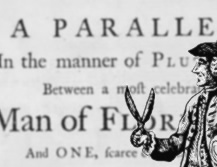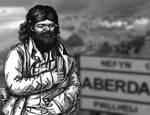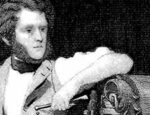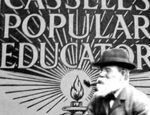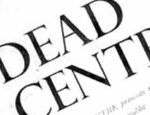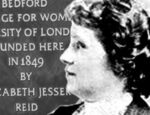Description
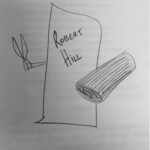 Meet Robert Hill (1699-1777), the itinerant tailor from Herefordshire, who in his teens and with only seven weeks’ of schooling under his belt taught himself to read Latin with the aid of an incomplete Latin grammar and three-quarters of a Littleton’s dictionary.
Meet Robert Hill (1699-1777), the itinerant tailor from Herefordshire, who in his teens and with only seven weeks’ of schooling under his belt taught himself to read Latin with the aid of an incomplete Latin grammar and three-quarters of a Littleton’s dictionary.
John Lemprière‘s Universal Biography of Eminent Persons in all Ages and Countries (1808) lists him as “a man remarkable for his perseverance and talent in learning many languages from books alone, and that under every disadvantage of laborious occupation… and extreme poverty.”
Hill first wanted to learn Latin so as to read the Latin inscriptions in his church. In 1717, his studies were interrupted by an invasion of small-pox in Buckingham, where he was living as bound apprentice to his father-in-law, a tailor. To avoid catching the disease, Hill was sent to Tring, where he was employed by his uncle as a shepherd. Hill loved the job because he could “lye under a hedge and read all day long”, when he was used to having to read secretly by candle at night time.
In 1719 he returned to Buckingham and his beloved Latin Grammar, beginning anew with his studies. The lack of a complete dictionary was an understandable stumbling block for Hill, but one which the industrious tailor cleverly overcame by running errands for the boys at the local free-school in exchange for their giving him the English translation of the Latin words he could not figure out from the rules in his grammar.
When he had saved up enough money on his tiny apprentice’s wage, he bought himself a Bezay’s Latin Testament to read. He was also bequeathed a copy of Caesar’s Commentaries. When he had served his time as apprentice and married his first wife, Hill was presented an edition of Horace’s poems and a Greek Testament by a local gentleman. This gift turned him onto learning Greek, in which task he was assisted by a young gentleman from Buckingham. In return Hill taught him to fish. A fair trade indeed.
In 1724 to supplement his tailor’s income and thus provide for his expanding family, he set up a school for the three Rs (reading, writing and arithmetic). After the death of his first wife and the intolerable debt built up by the extravagances of his second, he closed the school and took to the road as an itinerant mender of clothes and stays. In this impoverished occupation and at the age of thirty-four he embarked on the study of Hebrew, which – compared to Latin and Greek – he said he found perfectly easy.
Joseph Spence, who travelled to meet Hill, reported that the learned tailor was “a vast admirer of St Jerome; thinks him as fine a writer as Cicero; and that no body ever could excel him in eloquence.” In Spence’s A Parallel; in the manner of Plutarch: between a most celebrated man of Florence [Magliabechi], and one, scarce ever heard of, in England he reported that:“[Hill] had a Horace, and the Epistles of Ovid, among his books very early: but among them all, his chief acquaintance have been Homer, Virgil and Ogilby; and yet as to Homer, he had gone no farther than his Iliad (1758); which he had read over many time. The first day after he came to me, he desired to see the Odyssey; which I put into his hands, both in the original, and in Mr Pope’s translation. He was charmed with them both; but said: “He did not know how it was, but that it read finer to him in the latter, than in Homer himself.”

